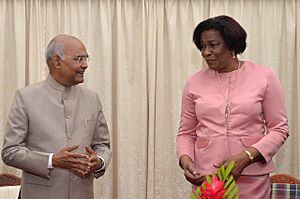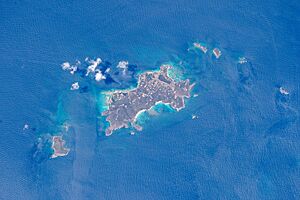Monarchy of Saint Vincent and the Grenadines facts for kids
Quick facts for kids King of Saint Vincent and the Grenadines |
|
|---|---|
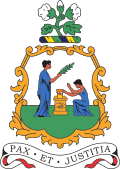
|
|
| Incumbent | |
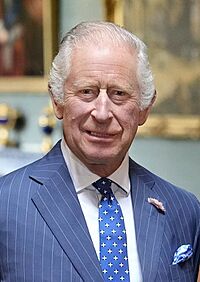 |
|
| Charles III since 8 September 2022 |
|
| Details | |
| Style | His Majesty |
| Heir apparent | William, Prince of Wales |
| First monarch | Elizabeth II |
| Formation | 27 October 1979 |
The monarchy of Saint Vincent and the Grenadines is a system of government where a King or Queen is the official head of state. This means the monarch is the top leader, but their role is mostly symbolic. Since September 8, 2022, King Charles III has been the monarch of Saint Vincent and the Grenadines. He represents the country's government and its history.
Even though King Charles III is also the monarch of 14 other independent countries in the Commonwealth of Nations, each country's monarchy is separate. So, he is officially called the King of Saint Vincent and the Grenadines. He and other members of the royal family perform public duties for Saint Vincent and the Grenadines. However, only the King has a role in the country's laws.
The King holds all the country's top powers, but most of these powers are used by elected officials. These include members of parliament, government ministers, and judges. The King's powers, like dismissing a prime minister, are usually kept for very important situations. They act as a safeguard to ensure stable government. The King's main job is to ensure the government runs smoothly and fairly. His representative in the country is the Governor-General.
Contents
How the Monarchy Began
It is believed that Christopher Columbus saw the island in 1498 and named it "Saint Vincent." The native Garifuna people, also known as "Black Caribs," strongly resisted European settlers. The French were the first to successfully settle the island in 1719. The British later took control during the Seven Years' War. They officially gained the island in 1763.
During another war with France (1778–1783), the French briefly recaptured Saint Vincent in 1779. But the British got it back in 1783. The islands then became part of the British Windward Islands, a British colony.
Saint Vincent and the Grenadines slowly gained more control over its own affairs. In 1776, a local assembly was allowed. In 1951, all adults were given the right to vote. The country also joined the West Indies Federation in 1958, but this group broke apart in 1962.
On October 27, 1969, Saint Vincent was given "associate statehood" by Britain. This meant it could manage its own internal matters. Finally, on October 27, 1979, Saint Vincent and the Grenadines became fully independent from the United Kingdom. It became its own country and an independent monarchy within the Commonwealth of Nations, with Queen Elizabeth II as its first monarch and head of state.
Prince Richard, Duke of Gloucester represented Queen Elizabeth II at the independence celebrations. He officially handed over the legal documents to Prime Minister Milton Cato. The Queen sent a message, saying she was pleased Saint Vincent and the Grenadines was joining the Commonwealth.
The Vincentian Crown
Saint Vincent and the Grenadines is one of fifteen independent countries, called Commonwealth realms, that share the same monarch. The monarch's role in Saint Vincent and the Grenadines is completely separate from their role in any other country. Even though they share the same person as monarch, each Commonwealth realm is independent.
The monarch is represented in Saint Vincent and the Grenadines by a viceroy, who is the Governor-General. Since independence in 1979, the monarchy in Saint Vincent and the Grenadines has become a local institution.

This separation is shown in several ways. For example, the monarch has a special Vincentian title. When acting for Saint Vincent and the Grenadines, the monarch uses national symbols, like the country's national flag. Also, only Vincentian government ministers can advise the monarch on matters related to Saint Vincent and the Grenadines.
In Saint Vincent and the Grenadines, the government is legally known as "His Majesty in Right of Saint Vincent and the Grenadines."
The Monarch's Title
In Saint Vincent and the Grenadines, the monarch's official title is: Charles the Third, by the Grace of God, King of Saint Vincent and the Grenadines and His other Realms and Territories, Head of the Commonwealth.
This title shows that Saint Vincent and the Grenadines is an independent monarchy. It highlights the monarch's specific role as the sovereign of Saint Vincent and the Grenadines. Usually, the monarch is simply called "King of Saint Vincent and the Grenadines."
Who Becomes Monarch Next?

The rules for who becomes the next monarch are based on primogeniture, which means the eldest child inherits the throne. These rules are set by laws like the Succession to the Crown Act 2013. This law states that only natural, legitimate descendants of Sophia of Hanover can inherit the throne. It also says the monarch cannot be a Roman Catholic and must be part of the Church of England.
Even though these laws are controlled by the British parliament, Saint Vincent and the Grenadines and the other Commonwealth realms must all agree to any changes. This is like a special agreement between these countries. Saint Vincent and the Grenadines agreed to the latest changes in 2013.
When a monarch dies or steps down, their heir immediately becomes the new monarch. There is no need for a special ceremony first. A period of mourning follows, and flags are flown at half-mast to honor the late monarch.
The Monarch as the State's Symbol
The monarch is seen as the living symbol of Saint Vincent and the Grenadines. The country is sometimes called His Majesty in right of His Government in Saint Vincent and the Grenadines or simply The King. For example, prisons in Saint Vincent and the Grenadines are called His Majesty's Prisons. This means the King owns all state property, but only in his role as monarch, not as a private person. This property belongs to the Crown forever and cannot be sold by the monarch without advice from the government.
The Monarch's Role in Government
The laws of Saint Vincent and the Grenadines create a government system similar to other Commonwealth realms. All government powers belong to the monarch. The monarch is represented in the country by the Governor-General, who is chosen by the monarch based on the advice of the Prime Minister.
The monarch's and Governor-General's roles are legal and practical, but not political. The Crown is like a company where different parts share power, with the monarch at the center. All government bodies act under the monarch's authority. The many powers of the Crown are known as the Royal Prerogative. These include making treaties, sending ambassadors, defending the country, and keeping peace. Parliament does not need to approve these actions.
Government Leadership
One of the Crown's main duties is to appoint a prime minister. The prime minister then leads the cabinet and advises the monarch or Governor-General on how to run the government. The monarch's and Governor-General's roles are mostly symbolic. They represent the legal authority under which the government operates. The cabinet decides how to use the Royal Prerogative, which includes declaring war, calling elections, and starting or ending parliamentary sessions.
However, the Royal Prerogative belongs to the Crown, not to the ministers. The constitution allows the Governor-General to use these powers alone in special situations, like dismissing a prime minister or dissolving parliament. The monarch also has specific duties, such as appointing the Governor-General.
The Governor-General appoints the person most likely to have the support of the House of Assembly of Saint Vincent and the Grenadines as prime minister. The Governor-General also appoints other ministers based on the prime minister's advice. The monarch is kept informed about government changes and holds regular meetings with Vincentian ministers when possible.
Dealing with Other Countries
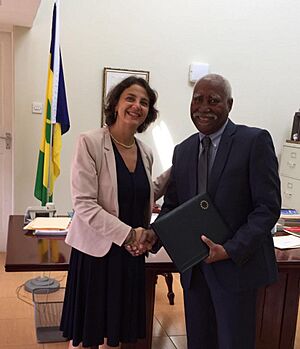
The Royal Prerogative also covers foreign affairs. The Governor-General approves treaties and international agreements. Parliament does not need to approve these. However, a treaty cannot change Saint Vincent and the Grenadines' local laws without a special Act of Parliament. The monarch, through the Governor-General, also approves Vincentian ambassadors and welcomes diplomats from other countries.
In foreign policy, the monarch acts only on the advice of the Saint Vincent and the Grenadines government. For example, in 2022, Queen Elizabeth II, as Queen of Saint Vincent and the Grenadines, approved a new ambassador to Nicolás Maduro Moros, the President of Venezuela. At the same time, as Queen of the United Kingdom, she recognized Juan Guaido as Venezuela's head of state.
Also, Saint Vincent and the Grenadines passports are issued in the Governor-General's name, as the monarch's representative.
Parliament's Role
The monarch, along with the House of Assembly of Saint Vincent and the Grenadines, forms the Parliament of Saint Vincent and the Grenadines. The Crown's authority is shown in the mace of the House of Assembly, which has a crown on top.
The monarch does not take part in making laws directly. However, the Governor-General gives Royal Assent to bills, which means approving them in the monarch's name. The constitution also says the Governor-General appoints senators. Six senators are appointed: four on the prime minister's advice and two on the opposition leader's advice. The Governor-General also calls, suspends, and dissolves parliament. After parliament is dissolved, elections are called by the Governor-General.
A new parliamentary session begins with the Opening of Parliament, where the monarch or Governor-General reads a speech. All laws in Saint Vincent and the Grenadines become official only after the Governor-General gives Royal Assent in the monarch's name.
Justice System
The monarch is responsible for ensuring justice for everyone and is seen as the fount of justice. In Saint Vincent and the Grenadines, serious crimes are considered offenses against the monarch. Legal cases are brought in the monarch's name, for example, The King versus [Name]. The law also states that the monarch "can do no wrong," meaning the monarch cannot be charged with crimes in their own courts.
The highest court for appeals in Saint Vincent and the Grenadines is the Judicial Committee of the King's Privy Council.
The Governor-General, on behalf of the monarch, can also grant immunity from prosecution or pardon offenses. This means they can forgive crimes before, during, or after a trial. This power is described in section 65 of the Constitution. Trying to kill the monarch or the Governor-General is considered "high treason" and can lead to a death sentence.
Cultural Importance
Awards and Honours
The monarch, as the source of honors, gives out awards in the country in his name. Most of these are given based on the advice of the Saint Vincent and the Grenadines government ministers. Nominations for honors are sent to the Governor-General in June and January for the New Year Honours and Birthday Honours.
In 2019, Prime Minister Ralph Gonsalves said that awards like knighthoods and CBE are national awards because they come from the Queen of Saint Vincent and the Grenadines.
The Police Force

The national police force is called the "Royal Saint Vincent and the Grenadines Police Force". The Crown is at the top of the police force. All new police recruits must promise loyalty to the monarch, who represents the state's authority. The oath they take includes:
"I, (name), do swear that I will well and truly serve Our Sovereign Lord the King as a member of the Police Force in Saint Vincent and the Grenadines without favour or affection, malice or ill will; and that I will cause His Majesty's peace to be preserved, and will prevent, to the utmost of my power, offences against the same, and that, during any time that I do or may hereafter hold any appointment in the Police Force, I will to the best of my knowledge and skill discharge all the duties thereof faithfully according to law. So help me God!"
The Crown of St. Edward is on the police force's badges, showing that the monarchy is the source of their authority.
Royal Visits
In 1959, Princess Margaret received a villa called Les Jolies Eaux on the island of Mustique as a wedding gift. She visited Mustique often and loved the place. In 1996, she gave the property to her son, David Linley. He later sold it in 1999.
Queen Elizabeth II visited in 1966, attending a church service and visiting a hospital and park. In 1979, Prince Richard, Duke of Gloucester represented the Queen at the independence celebrations. In 1985, the Queen and Duke of Edinburgh attended the Independence Anniversary Parade. The Duke of York visited in 2004, seeing the Botanical Gardens and a banana farm.
In 2012, the Earl and Countess of Wessex visited for the Queen's Diamond Jubilee. They planted trees and watched traditional dances. Prince Harry visited in 2016, seeing the Botanic Gardens and learning about conservation.
My family has long enjoyed a particularly close association with these beautiful islands, and so it gives us such pleasure that we should be able to visit you and to bring with us The Queen's warmest greetings.
The Prince of Wales and the Duchess of Cornwall visited in March 2019. They toured mangrove parks, discussed domestic violence, and met young people. They also laid a wreath at the Cenotaph and visited the Kingstown Market. The Prince planted a Soufriere Tree, the national flower.
The Earl and Countess of Wessex visited again in April 2022 for the Queen's Platinum Jubilee. They attended a sprint race, met sports teams, and visited a dance company. They also presented awards and planted a tree at the Botanical Gardens.
Debate About the Monarchy
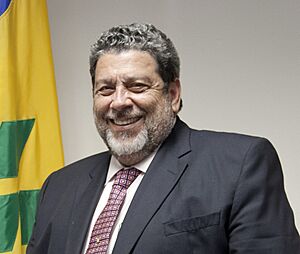
In 2002, Prime Minister Ralph Gonsalves started a process to change the country's constitution. In 2009, a new law was proposed to replace the monarch with a non-executive president. Vincentians voted in a referendum on this new constitution. Prime Minister Gonsalves supported the change, saying it was time for Saint Vincent to have its own head of state.
The vote took place on November 25, 2009. The proposal was defeated, with 56% of voters against it. Only 43% supported the new constitution, which was not enough to pass.
In 2016, Gonsalves introduced a bill to change the oaths of allegiance. Instead of swearing loyalty to the monarch, officials now swear loyalty to Saint Vincent and the Grenadines. Gonsalves said this change did not disrespect the Queen.
In 2019, during a royal visit, Gonsalves said he would not hold another referendum on the monarchy. He stated, "I'm not a monarchist, but I accept it, the Queen of England not only legally but politically is the Queen of St Vincent and the Grenadines and I accept that." However, in 2022, Gonsalves again suggested a vote on the monarchy, but only if both major political parties agreed. In May 2023, around the time of King Charles III's coronation, Gonsalves called the monarchy "an absurdity" that he wanted to end in his lifetime. However, a poll found that 63% of Vincentians supported keeping the monarchy.
List of Vincentian Monarchs
| Portrait | Regnal name (Birth–Death) |
Reign over Saint Vincent and the Grenadines | Full name | Consort | House | |
|---|---|---|---|---|---|---|
| Start | End | |||||
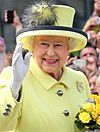 |
Elizabeth II (1926–2022) |
27 October 1979 | 8 September 2022 | Elizabeth Alexandra Mary | Philip Mountbatten | Windsor |
| Governors-general: Sir Sydney Gun-Munro, Sir Joseph Lambert Eustace, Sir David Emmanuel Jack, Sir Charles Antrobus, Sir Frederick Ballantyne, Dame Susan Dougan Prime ministers: Milton Cato, Sir James Fitz-Allen Mitchell, Arnhim Eustace, Ralph Gonsalves |
||||||
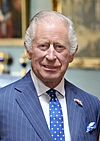 |
Charles III (b. 1948) |
8 September 2022 | present | Charles Philip Arthur George | Camilla Shand | Windsor |
| Governors-general: Dame Susan Dougan Prime ministers: Ralph Gonsalves |
||||||
See also
- Lists of office-holders
- List of prime ministers of Elizabeth II
- List of prime ministers of Charles III
- List of Commonwealth visits made by Elizabeth II
- Monarchies in the Americas
- List of monarchies
 | Lonnie Johnson |
 | Granville Woods |
 | Lewis Howard Latimer |
 | James West |


